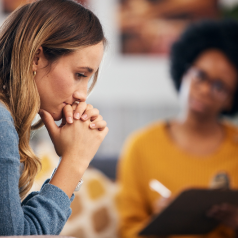-
 How to Navigate Two Different Parenting Styles
How to Navigate Two Different Parenting Styles
Parenting is difficult on its own, but when you and your partner, or co-parent, have different approaches to such an all-consuming role, frustration is likely to flair, impacting not only ... Read More
-
 Where to Start: Mental Health in a Changing World
Where to Start: Mental Health in a Changing World
May is Mental Health Awareness Month, and there’s no better way to start it off than taking the first step in seeking help or assisting those who would like to start counseling. Doing ... Read More
-
 How to Talk to a Therapist about Depression
How to Talk to a Therapist about Depression
By the nature of how depression manifests itself, it’s often hard for those in its grip to seek any support, let alone therapy. And while it may seem like everyone else isn’t struggling, ... Read More
-
 Nutrition and Culinary Skills in Eating Disorder Treatment
Nutrition and Culinary Skills in Eating Disorder Treatment
The appropriate level of eating disorder care depends on a patient’s ability to consume and retain proper nutrition. A qualifying criterion to enter a residential treatment center is ... Read More
-
 What am I missing? Part 2: Applying Attachment Theory to Treatment and Recovery
What am I missing? Part 2: Applying Attachment Theory to Treatment and Recovery
Addiction is an attachment disorder. Human beings, addicts or not, only know and repeat what was modeled for them during childhood. I like to call ages 0-10 healthy narcissism given ... Read More
-
 What am I missing? Part 1: Defining the Problem and Attachment Theory
What am I missing? Part 1: Defining the Problem and Attachment Theory
“what am I missing; I keep relapsing and don’t know why I have such a difficult time remaining clean and sober?” How we treat addiction in treatment must change. The idea that ... Read More
-
 How to Prepare for Couples Therapy
How to Prepare for Couples Therapy
From navigating parenthood to coping with work stress, there are a seemingly endless number of challenges couples will have to grapple with over the course of their relationship, and sometimes ... Read More
-
 How Emotion-Focused Therapy is Used in Couple Counseling
How Emotion-Focused Therapy is Used in Couple Counseling
There is no one-size-fits-all approach when it comes to couples counseling, as each relationship comprises different challenges and experiences. But some therapeutic strategies have proven ... Read More
-
 How to Stop Fighting and Start Communicating with your Partner
How to Stop Fighting and Start Communicating with your Partner
“Stop fighting with each other and start fighting for one another”– Staci Lee Schnell In a fight, there is a winner and a loser and most of us want to win. So, if you are ... Read More
-
 Worried About Your Child or Teen? 3 Things You Can Do Right Now
Worried About Your Child or Teen? 3 Things You Can Do Right Now
I have good news and bad news. People usually want the bad news first, so here goes: You, alone, do not have the power to make your child happy. None of us do. That’s the bad news. Okay, ... Read More
-
 How to Decrease Burnout at Work or School
How to Decrease Burnout at Work or School
Burnout syndrome manifests itself in various forms, from cynical outlooks on life to detachment from relationships and hobbies, and it can arise from personal, professional or academic ... Read More
-
 Unlocking the Introvert’s Guide to Success in Therapy: 10 Effective Strategies
Unlocking the Introvert’s Guide to Success in Therapy: 10 Effective Strategies
Are you someone who prefers quiet reflection over loud chatter? If so, stepping into the world of therapy might feel like navigating uncharted territory. But fear not, because we’ve ... Read More
Browse by Category
Browse by Category
Therapy News Headlines
-
Recovering from a Traumatic Birth
Dealing with the Trauma of Giving Birth For many new mothers, giving birth is one of the most exciting times in life. After all, you’re bringing ... Read More
-
Dr. Aaron T. Beck: The Father of Cognitive Behavioral Therapy
Dr. Aaron T. Beck: The Father of Cognitive Behavioral Therapy On Monday, Nov. 1, the world lost an incredible psychiatrist when Dr. Aaron T. Beck, ... Read More
-
5 Tips for Helping a Client When You’re Both Stuck
by Megan Paterson, Licensed Marriage and Family Therapist in Roseville, California 5 Tips for Helping a Client When You’re Both Stuck Ever had a client ... Read More
-
Business Formation for Therapy Practices
by Connor D. Jackson, JD Connor D. Jackson is a healthcare attorney based in Chicago who serves independent practices in several states. Visit his firm’s ... Read More
-
Putting Kids First: Choosing Marital Partnerships and Co-Parenting over Divorce
Putting Kids First: Choosing Martial Partnerships and Co-Parenting over Divorce As many couples find out the hard way, the spark that led to them falling ... Read More
Dear GoodTherapy.org
-
Help! My Therapist Ended Her Practice and I Don't Know What to Do
I had been seeing my therapist for 28 years. Around March, she was unwell. This was a rare occurrence in our time together. But her viral infection ... Read More
-
Help! I Have No One to Talk To
Ever since my dad died last year, I have had no one to talk to. And really, I had no one to talk to for the last three years of his life, ravaged ... Read More
-
I Don’t Want to See My Family Anymore
Ever since my dad died last year, I have had no one to talk to. And really, I had no one to talk to for the last three years of his life, ravaged ... Read More
-
How Do I Trust a Therapist If I Can't Trust Anyone?
Ever since my dad died last year, I have had no one to talk to. And really, I had no one to talk to for the last three years of his life, ravaged ... Read More
-
Help! I Want to Stop Competing with My Friend
My best friend and I have known each other since college. We started out as “enemies,” Read More


